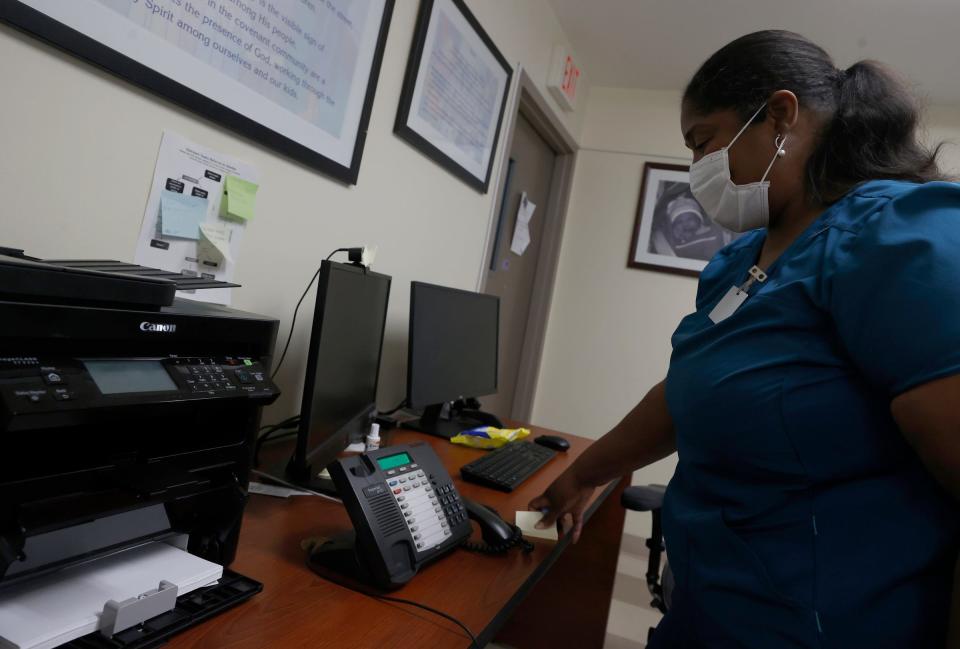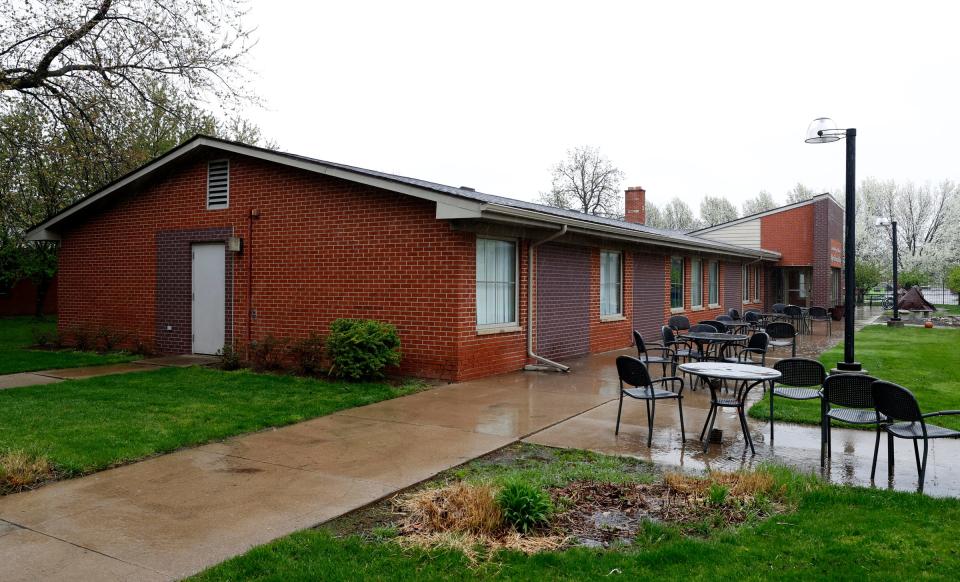Covenant House outreach manager always answers the phone. Even at 3 a.m.
Stephanie Taylor always answers the phone — office and cell, day and night.
As outreach manager at Covenant House Michigan, a youth homeless shelter, she has seen it all — she knows how every second counts when a caller is in trouble.
So when a 23-year-old man called the facility earlier this week to ask about a place to stay, she immediately offered to go pick him up.
“If you don't have a car, you don't have to catch the bus,” Taylor told him. “That's what we're here for. We'll pick you up, so you don't have to go through that.”
“You guys would do that for me?” the man asked, incredulously.
Welcome to Covenant House, a nonprofit that aims to help homeless youths ages 18-24 get back on their feet, find independence and break out of the cycle of trauma that landed them there in the first place. Now, in its 25th year, the organization has overcome barriers, including the COVID-19 pandemic, and remains a lifeline for young adults who have nowhere else to go.

Taylor has been working at Covenant House for 24 years. Her volume is always turned up — sometimes she gets calls from young adults who need help at 3 or 4 a.m.
If nobody answers, the consequence could be dire.
Meanwhile, in a room next door, an 18-year-old boy filled out his intake papers so he could begin his stay. He said his mom is struggling and he can’t stay with her anymore. He knows he can trust Covenant House because his older brother used to stay at the shelter.
Both men remain anonymous to protect their privacy.
This is Taylor's day-to-day life, and there's nothing she'd rather be doing.
"A lot of (the young adults) are so sad when they first come, and some of them are really appreciative," Taylor said. "And then we have had some that are mad at the world, even mad at us because of what they're going through, but we're just here to try to eliminate any barriers and let them know we still care and want to try to help."
Different than other shelters
Covenant House is an organization spread across the Americas, from Canada, to Michigan to Honduras.
In Michigan specifically, there are two locations, one in Detroit and one in Grand Rapids. There are also three charter schools: one at the Detroit campus, one in southwest Detroit and one in Grand Rapids.
"These schools were set up specifically for homeless youth, to help them look into their needs, and work with them on their level, to eventually get a high school diploma," said Gerry Piro, executive director of Covenant House Michigan. "It is not only for kids (in our program) anymore, it's for anyone that wants to go to that school."

The schools are smaller, with about 200 students in all of them combined, but that means teachers can focus on giving each student a personalized education, Piro said.
When young adults first get to a Covenant House shelter, they take a COVID-19 test, take a shower, put on clean clothes and eat a hot meal, all provided by the shelter.
Then, they head to the Crisis Care shelter. The shelter typically has 45 beds, but capacity is limited during the pandemic to protect the health of residents.
There's also the Right of Passage shelter, where the young adults move when they feel ready to transition to independent living. Here, they are provided with employment opportunities and budgeting guidance.
Taylor said the age limits help residents feel more comfortable, as it can be hard for an 18- or 20-year-old to feel safe and comfortable with older adults.
The Detroit campus has both shelters, as well as a school and dining hall on its grounds.
Building trust
Piro said he often hears harmful and incorrect stereotypes about people who are experiencing homelessness. The majority of the time, it's a direct result of their environment growing up, he said.
"Many of these young people that come here have aged out of foster care," Piro said. "I'm sure that pretty much every kid that came here probably had a difficult time during their childhood, because many times it's 'my mother had a new boyfriend, and he kicked me out.' Or they didn't know their parents, or if they did, then one was deceased, or they couldn't afford the person … no one chooses to be here unless they are homeless, by whatever happened to them in their life."

Although the people who stay at Covenant House are legal adults and have to be at least 18, they're still kids, Piro said, and they want to work to change their lives.
"They're coming here to make a commitment," Piro said. "When they come through our doors, they're making the commitment that they're going to do the best that they can to turn their life around, to start to become a member of society, one that's ready to be educated, one that's ready to start working, and one that is ready to work on the issues that they have."
Covenant House has no shortage of success stories — young adults come in, get their degrees, get a job, learn how to budget their money, save up for independent housing and continue to save and maintain an independent lifestyle.
But it's not always that easy.
Sometimes, people will come in wanting help but aren't quite ready to ask for it, Taylor said. So, they'll utilize the resources without staying overnight.
"Say a young person doesn't want to go to the shelter and they just want to come in here, take a shower, eat, and take some clean clothes, we do that too," she said. "And we give it to them because they don't trust people right away. We don't turn them away."

Other times, they have "repeat customers," Piro said. The young adults will leave the shelter with a job and a voucher for a place to live, but they still need help holding onto it. It isn't a bad thing if they come back, he said, because it means they're still trying.
It can be hard to break the cycle, especially when housing instability is all they've known growing up, Piro said.
"(The young adults) get stuck in thinking, 'where's my family? Why aren't they here?' " Piro sid. "There's just no role model. It's difficult to get them off of that and get them to focus on themselves. ...They pick up with the wrong crowd, they hang out in abandoned houses or abandoned cars. You know, we also get them into housing, and they get vouchers so for almost a year, they don't have to pay rent, but if they don't follow the rules, they lose the housing."
With COVID-19, the organization has faced even more challenges, including staff shortages. Each employee is forced to work longer hours and do more. Taylor said she added taking residents to their doctor's appointments and meeting with their teachers to her job role.

But she is happy to do it — she genuinely doesn't mind the 3 a.m. calls or the appointments. She said she feels blessed to be able to do this job.
“We have to make sure we protect and safeguard all our young people and eliminate any barriers," Taylor said. "We want (them) to be comfortable, to know that they're going through something, but there's so many people around that care about them.”
You can donate to Covenant House Michigan at https://covenanthousemi.org/donate/.
Contact Emma Stein: estein@freepress.com and follow her on Twitter @_emmastein.
This article originally appeared on Detroit Free Press: Covenant House breaks down barriers for homeless young adults

